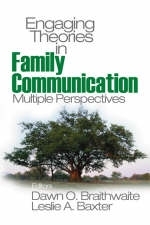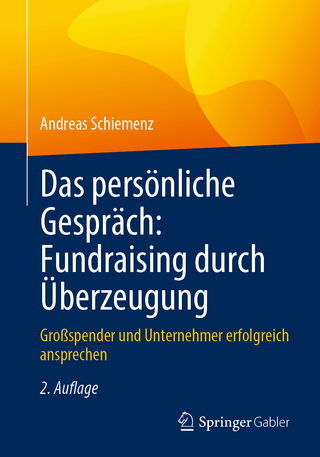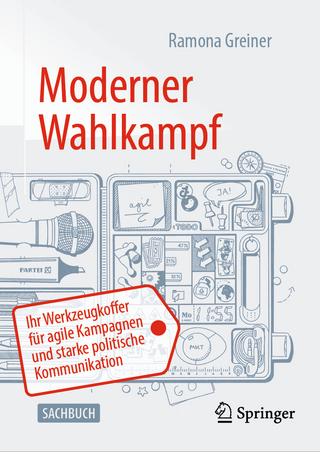
Engaging Theories in Family Communication
SAGE Publications Inc (Verlag)
978-0-7619-3061-7 (ISBN)
To date, scholars from disciplines other than communication have dominated the study of family communication, and theory has never been positioned as the centerpiece of a book dealing with this subject matter. Engaging Theories in Family Communication covers uncharted territory in its field, as it is the first book on the market to deal exclusively with family communication theory. Its editors (Dawn O. Braithwaite and Leslie A. Baxter) and contributors (including Valerie Manusov, Tamara Golish, Fran Dickson, Julia Wood, Kory Floyd, Sandra Petronio, Beth LePoire, Kathleen Galvin, Mary Ann Fitzpatrick, and Anita Vangelisti) compose a veritable Who's Who in the family communication field. As a core text or a companion text to other topically-based family communication texts, Engaging Theories in Family Communication is written at the level that advanced undergraduate and graduate students can understand, and it will be a valuable resource for scholars, and have applicability and interest coming from family studies, sociology, and psychology as well. Key Features: There is no other book on the market that focuses specifically on family communication theories.
Twenty theories, both classical and cutting-edge, each covered in a separate chapter in the volume, each dealing with: (1) purpose of the theory, (2) major features as relevant to the understanding of family communication, (3) how the chapter fits into the section in which the editors have placed it (theories in family communication, theories of communication, theories of family communication), (4) how this theory has been used to understand communication in the family and how this theory could be used to understand communication in the family, (5) strengths and limitations of the theory to shed light on family communication, and (6) research directions for future researchers using this theory The editors (Braithwaite and Baxter) and contributors represent a virtual "Who's Who" of leading scholars in the field of family communication
Dawn O. Braithwaite (Ph.D., University of Minnesota; M.A., California State University, Long Beach, B.A., California State University Fullerton) is nationally recognized as one of the leading scholars in family communication. She was president of the National Communication Association in 2010, past president of the Western States Communication Association (2000), and past chair of the Interpersonal Communication Division at NCA. She was named the Distinguished Scholar by the Western States Communication Association in 2014. Braithwaite is the recipient of numerous research and service awards (among them: 2011 NCA Family Communication Division Distinguished Book Award, 2007 WSCA Distinguished Service Award, 2006 NCA Brommel Award for Family Communication, 2002 University of Nebraska-Lincoln Award for Outstanding Research and Creative Achievement in the Social Sciences, 2000 ACA Gerald Phillips Mentoring Award), and numerous Top Paper Awards in interpersonal and family communication. She is a Senior Research Fellow of the Council on Contemporary Families. She is co-author of the college textbooks Family communication: Cohesion and change (Pearson, (c), 2015), Casing Interpersonal Communication (Kendall Hunt, (c)2011, 2015) and Engaging Theories in Family Communication (Sage, (c)2006) and sits or has sat on many editorial journal boards including: Journal of Social and Personal Relationships; Journal of Family Communication; Western Journal of Communication; Journal of Applied Communication Research; Communication Studies; and Communication Monographs. She, along with co-editor Paul Schrodt, is one of the best connected and well-regarded scholars within the discipline. Leslie A. Baxter is F. Wendell Miller Distinguished Professor of Communication Studies at the University of Iowa, where she has taught for 15 years. She has published over 130 books, book chapters, and articles on interpersonal and family communication. She is the recipient of many awards, including, from the National Communication Association, the Distinguished Scholar Award, the Bernard Brommel Family Communication Award, the Charles Woolbert Research Award, the Franklin Knower Article Award, and the Gerald Miller Book Award; the Berscheid-Hatfield Award from the International Association for Relationship Research (formerly INPR); and the inaugural WSCA Scholar Award from the Western States Communication Association.
Preface - Dawn O. Braithwaite and Leslie A. Baxter Foreword: Family Communication Theories: Variations and Challenges - Anita L. Vangelisti 1. Introduction: Meta-Theory and Theory in Family Communication Research - Leslie A. Baxter and Dawn O. Braithwaite I. Theories Originating in Communication 2. Communication Accommodation Theory: An Intergroup Approach to Family Relationships - Jake Harwood, Jordan Soliz & Mei-Chen Lin 3. Communication Privacy Management Theory: Understanding Families - Sandra Petronio & John Caughlin 4. Family Communication Patterns Theory: A Social Cognitive Approach - Ascan F. Koerner & Mary Anne Fitzpatrick 5. Goals-Plan-Action Theories: Theories of Goals, Plans, and Planning Processes in Families - Steven R. Wilson & Wendy M. Morgan 6. Inconsistent Nurturing as Control Theory: A New Theory in Family Communication - Beth A. Le Poire & Rene M. Dailey 7. Narrative Performance Theory: Telling Stories, Doing Family - Kristin M. Langellier & Eric E. Peterson 8. Relational Communication Theory: An Interactional Family Theory - L. Edna Rogers 9. Relational Dialectics Theory: Multivocal Dialogues of Family Communication - Leslie A. Baxter 10. Symbolic Conergence Theory: Communication, Dramatizing Messages, and Rhetorical Visions in Families - Dawn O. Braithwaite, Paul Schrodt & Jody Koenig Kellas II. Theories Originating in Complementary Fields 11. Attachment Theory: The Reciprocal Relationship Between Family Communication and Attachment Patterns - April R. Trees 12. Attribution Theories: Assessing Causal and Responsibility Judgments in Families - Valerie L. Manusov 13. Critical Feminist Theories: A Provocative Perspective on Families - Julia T. Wood 14. Emotion Regulation Theory: A Lens for Viewing Family Conflict and Violence - William R. Cupach & Loreen N. Olson 15. Social Theories: Social Constructionism and Symbolic Interactionism - Wendy Leeds-Hurwitz 16. Social Exchange Theories: Interdependence and Equity - Marianne Dainton & Eliane D. Zelley 17. Social Learning Theory: Modeling and Communication in the Family Context - Adrianne Kunkel, Mary Lee Hummert & Michael Robert Dennis 18. Stress and Adaptation Theories: Families Across the Lifespan - Tamara Afifi & Jon Nussbaum 19. Structuration Theory: Promising Directions for Family Communication Research - Kathleen Krone, Paul Schrodt & Erika Kirby 20. Systems Theory: Patterns and (W)holes in Family Communication - Kathleen Galvin, Fran Dickson, and Sherilyn R. Marrow 21. The Theory of Natural Selection: An Evolutionary Approach to Family Communication - Kory Floyd & Mark T. Haynes Index About the Editors About the Contributors
| Erscheint lt. Verlag | 20.10.2005 |
|---|---|
| Zusatzinfo | black & white illustrations |
| Verlagsort | Thousand Oaks |
| Sprache | englisch |
| Maße | 152 x 229 mm |
| Gewicht | 513 g |
| Themenwelt | Sozialwissenschaften ► Kommunikation / Medien ► Kommunikationswissenschaft |
| Sozialwissenschaften ► Soziologie ► Mikrosoziologie | |
| ISBN-10 | 0-7619-3061-2 / 0761930612 |
| ISBN-13 | 978-0-7619-3061-7 / 9780761930617 |
| Zustand | Neuware |
| Haben Sie eine Frage zum Produkt? |
aus dem Bereich


